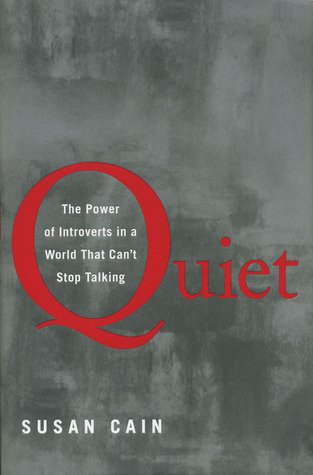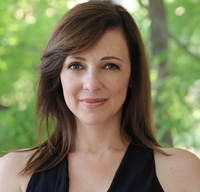
Quiet: The Power of Introverts in a World That Can't Stop Talking
by Susan Cain
Narrator: Kathe Mazur
Published: January 24, 2012
Genres: Audiobook, Non-fiction, Self Help
Format: Audiobook (10 hrs and 39 mins)
Source: Library
moreAt least one-third of the people we know are introverts. They are the ones who prefer listening to speaking, reading to partying; who innovate and create but dislike self-promotion; who favor working on their own over brainstorming in teams. Although they are often labeled "quiet," it is to introve...
Quiet changed how I view introverts and made me realize how many biases there are against them. Our society values people who are outgoing and people who are shy are considered to have some sort of flaw even though that is their natural personality. I had never thought about or even realized how our society values a very “narrow range of personality styles. (pg. 3)” As an introverted person, I didn’t think I would have any biases against people who are labeled as shy. Was I wrong. Many shy people are encouraged to be social and change which gives them a feeling that something is wrong with them instead of them just having a different personality.
Introversion— along with its cousins sensitivity, seriousness, and shyness— is now a second-class personality trait, somewhere between a disappointment and a pathology. Introverts living under the Extrovert Ideal are like women in a man’s world, discounted because of a trait that goes to the core of who they are.
-Susan Cain, Quiet: The Power of Introverts in a World That Can’t Stop Talking (p. 4)
My favorite thing about this book was how it showed that introverts have strengths just by being who they naturally are. An example she used was Rosa Parks who was “shy and courageous (pg. 2).” Susan Cain points out that the Civil Rights movement wouldn’t have gotten started if Rosa Parks had been an outgoing and loud person. It succeeded because she was a quiet, well respected person and the fact that she stood up for herself gained more attention because it was easier for people to realize the huge injustice of it since she was acting against her personality.
Here are a few of the strengths that an introverted person naturally has:
- Function well without sleep (pg. 3)
- Good at negotiating because their mild-mannered disposition allows them to take strong/aggressive positions and be accepted more easily (pg. 8)
- Think before they speak or act (pg. 8, 168)
- Prepare more for speeches and negotiations (pg. 8)
- Asks lots of questions and listens intently to answers that leads to strong negotiation skills (pg. 8)
- Work slowly and deliberately (pg. 11)
- Ability to focus intently on one task and high abilities of concentration (pg. 11)
- Relatively immune to the temptation of wealth or fame (pg. 11)
- Able to delay gratification (pg. 163)
- Don’t give up easily (pg. 168)
- Leadership style that wins people over (pg. 197)
- Work independently which can lead to innovation (pg. 74)
I loved hearing the definition of an introverted person that wasn’t framed in a negative way compared to an extroverted person. An introverted person enjoys less stimulation which is why they tend to like things like reading. They recharge by being alone while extroverted people recharge by socializing. All introverted people are not necessarily shy. I really liked Susan’s illustration of how shyness and introversion were two different things.
Shyness is the fear of social disapproval or humiliation, while introversion is a preference for environments that are not overstimulating. Shyness is inherently painful; introversion is not.
– Susan Cain, Quiet: The Power of Introverts in a World That Can’t Stop Talking (p. 12)
There’s a quiz in the book to see which end of the spectrum of introversion/extroversion you fall on. She states several times that no one is completely extroverted or introverted. I did get 15/20 on the test which means I fall heavily on the introverted side. So this book felt very relevant to me. But even if you don’t feel like an introverted person, this book has so much value because it’s pretty much guaranteed that you know or are related to someone introverted and it can help you understand and relate to them.
One epiphany I had about myself was learning that some introverted people are sensitive. There’s a study in the book about babies who had personality assessments when they were babies and again when they had grown up. They found the babies who were sensitive, who cried at loud noises and bad smells more easily turned out to be mellow, introverted adults. The babies who were easy going and didn’t react much to new things grew up to be more outgoing. It seems like it should be the other way around, but it makes sense. If an introverted baby is overwhelmed by stimulation, they choose to be around less stimulation as they become adults. I immediately called my mom when I read this study because I will never live down the stories of being the baby who was scared of the orange rug every time I sat on it, the lamp from just looking at it, and my aunt’s braces when she smiled. And when Susan Cain is talking about sensitivity she is using the psychological term.
Many introverts are also “highly sensitive,” which sounds poetic, but is actually a technical term in psychology. If you are a sensitive sort, then you’re more apt than the average person to feel pleasantly overwhelmed by Beethoven’s “Moonlight Sonata” or a well-turned phrase or an act of extraordinary kindness. You may be quicker than others to feel sickened by violence and ugliness, and you likely have a very strong conscience.
-Susan Cain, Quiet: The Power of Introverts in a World That Can’t Stop Talking (p. 14)
It’s as if, like Eleanor Roosevelt, they can’t help but feel what others feel.
-Susan Cain, Quiet: The Power of Introverts in a World That Can’t Stop Talking (p. 138)
I wasn’t expecting this book to help me think about what I really want to do with my life. Introverts are more likely to ignore their own preferences for career choices. The author talks about her career choice as a lawyer and even though she was good at it, she didn’t enjoy or even want to do it. She listed three steps to finding out what you love to do.
- First, think back to what you loved to do when you were a child. (pg. 218)
- Second, pay attention to the work you gravitate to. (pg. 218)
- Finally, pay attention to what you envy. Jealousy is an ugly emotion, but it tells the truth. You mostly envy those who have what you desire. (pg. 218)
When I went through these steps I realized that I love reading and reviewing books. Go figure after studying music and then finance in college that I would eventually come back to reading which I have loved doing since elementary school. Blogging about books has been such a great outlet and way for me to write which I also loved doing. I had to giggle when I came across this quote because my husband can’t believe some of the things I post on my blog for the world to see sometimes.
Studies have shown that, indeed, introverts are more likely than extroverts to express intimate facts about themselves online that their family and friends would be surprised to read…
-Susan Cain, Quiet: The Power of Introverts in a World That Can’t Stop Talking (p. 63)
If being introverted is so great, why isn’t it valued in our society? There’s an entire chapter that talks about the shift in American culture to over-emphasize the value of extroverted people that led to a devaluing of introverted people. It was very interesting. It involves industrial change, work force changes, and even parenting changes. She compares other cultures to America’s (like China) and shows how their value of extroversion is not as strong or even the opposite and how that affects their culture. The biggest thing that contributed to extroversion being over-valued has to do with the business world. Loud, fast talking people are seen as leaders even if it negatively affects others. Harvard Business School teaches that true leaders have quick and assertive answers which might have led to many of the financial crises since the slow and cautious decision makers were mostly dismissed. There was a study in the book that questioned whether extroverted people are always the best leaders. It turns out they are excellent leaders if their employees are very passive, but in a work environment where the employees are more proactive an introverted leader is actually more efficient at utilizing the knowledge and experience of their employees.
You would think that as an introverted person it would be easy to parent an introverted child. That’s not necessarily true and I enjoyed the parenting tips in the book. I need to remember that my child is just sensitive to things that are new in general and not to label him as shy or anti-social.
I feel like I know myself a little better after reading Quiet. I can recognize now when I’m feeling overwhelmed from stimulation and I make it a point to take time to myself to read or spend time on my own. It’s made me a lot happier. I also have been standing up for myself more, but in my own way by asking lots of questions and not being afraid to speak my mind just because I’m not a loud person. It also made me realize the social pressures I had been putting on myself and my kids. I always felt guilty for not having “enough” play dates and social time. And by “enough” I mean daily play dates. I realize now that the pace of a few times a week makes both my and my kids happy. I don’t feel pressure to have them constantly doing something with other kids anymore. Most of all it helped me realize that I am not an anti-social person. Now that I’m aware that going out with lots of friends or to parties will drain me, I make time to wind down afterwards and I no longer turn down social invitations since I understand my personality better. I feel like for me, this book accomplished what Susan Cain wanted it to.
If there is only one insight you take away from this book, though, I hope it’s a newfound sense of entitlement to be yourself.
-Susan Cain, Quiet: The Power of Introverts in a World That Can’t Stop Talking (p. 16)
Overall, Quiet shifted my perspective on what it means to be introverted and I learned a lot about myself in the process. I highly recommend this book.
Content Rating: Mild, for very brief swearing.
This post contains affiliate links and I receive a small percentage of sales made through these links.
Reading this book contributed to these challenges:








 My name is Jessica. I love to read Young Adult and classic literature. I’ve been a book blogger for six years and I haven’t gotten tired of it yet. I’m a very curious reader. Writing about all the questions and thoughts I had while reading a book is the best hobby ever.
My name is Jessica. I love to read Young Adult and classic literature. I’ve been a book blogger for six years and I haven’t gotten tired of it yet. I’m a very curious reader. Writing about all the questions and thoughts I had while reading a book is the best hobby ever.
I NEED to read this book! I’m an introvert, and my in-laws totally don’t get it. They think I hate them because I don’t want to socialize. I don’t give hugs. I just want to sit and listen or sit and read. It is hard.
I loved the quotes you shared! Thanks for your review!
This is high on my To-Read list. I think I’m going to listen to the audiobook. I’m an incredibly introverted person myself. I’m a children’s librarian, and we have this book thing every summer called, appropriately, The Summer Reading Program. And kids talk to me about the books they’ve read. But every once in awhile I’ll see a kid who’s very shy, and introverted, and I hate making them talk to me. Because I was that kid. And I never would have even done the SRP if I had to talk to the librarian. So this year, I’m going to give those kids an option to write something down or drawn something (depending on their ages) instead of being forced to talk to me.
I cannot wait to read this book. Also, I really want to take that quiz.
I’ve heard so many good things about this book, and your great review just makes me want to read it even more.
I’m curious to see how I’d score on that quiz.
Oh my goodness. Okay first of all, this is a fantastic review and I loved reading your thoughts and summaries of the major points. And second, wow this sounds life-changing! I mean, I already had wanted to read this when you first recommended it to me, but now I’m somehow even more keen. Powerful!!